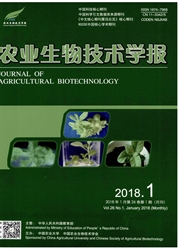

 中文摘要:
中文摘要:
高温逆境下,植物膜透性的增加导致细胞代谢紊乱并诱导热激基因表达。脂肪酸是构成生物膜的主要物质,饱和脂肪酸的含量及饱和程度高,有利于保持膜在高温时的流动性和稳定性。本研究利用小麦(Triticum aestivum)耐热基因型TAM107和热敏感基因型中国春(CS)为对象,研究了高温胁迫对膜透性、叶绿素荧光参数Fv/Fm、膜脂组分及其相关脂肪酸去饱和酶基因(FAD7)表达的影响,结果表明,高温胁迫下,两基因型膜透性均增加,膜脂中的三烯脂肪酸含量下降,但TAM107变化幅度明显高于中国春,在脂肪酸水平上说明耐热小麦品种的膜系统较热敏感品种对高温逆境有较强的耐受性;中国春比TAM107中FAD7的表达对高温更加敏感,这直接影响了热胁迫前后膜脂中三烯脂肪酸含量的变化,在转录水平上说明了耐热小麦基因型较热敏感基因型对高温逆境有较强的耐受性。三烯脂肪酸含量在热胁迫前后的变化可作为一种新的耐热鉴定指标。
 英文摘要:
英文摘要:
The increase of membrane permeability in plant cell results to imbalance in cellular homeostasis and expression of heat shock gene. As fatty acids are the basic elements of the cell membrane, the content and the saturation of lipid are related to the cell membrane stability under high temperature. Two genotypes of Triticum aestivum L. tolerant TMA107 and susceptible Chinese spring(CS), were chosen according to their genetic background diversity in thermotolerance. Membrane permeability, the fluorescence ratios Fv/Fm,fatty acids composition (C14:0, C16:0, C16:1c, C16:1t, C18:0, C18:1, C18:2 and C18:3) and transcript of fatty acid desaturase gene (FAD7) under high temperature were quantified. Increase of membrane permeability and reduction of fluorescence ratios Fv/Fm and trienoic fatty acids content were observed in both genotypes. However, changes in unsaturated fatty acids content in Chinese spring were significantly higher than that of TAM107. These indicated that the membrane system of heat resistant genotype wheat is much more stable under heat stress than heat sensitive genotype. The expression of FAD7 was more sensitive to heat stress in CS than in TAM107, and as a result, the content of trienoic fatty acids in membrane changed much more in CS after heat stress . This indicated that the susceptible genotype CS is more sensitive to high temperature than tolerant genotype TAM107 on transcript level. The observed changes on trienoic fatty acid content under high temperature may be a positive trait for heat tolerance qualification.
 同期刊论文项目
同期刊论文项目
 同项目期刊论文
同项目期刊论文
 期刊信息
期刊信息
